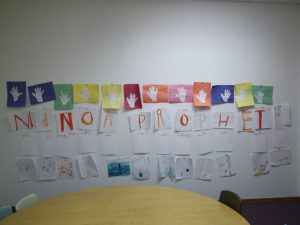
“If we confess our sins, he is faithful and just to forgive us our sins, and to cleanse us from all unrighteousness.”
1 John 1:9
Joel was a prophet of God. The name Joel means, “Jehovah is God.” The book of Joel begins with, “The word of the LORD that came to Joel ….” In the book of Joel, we recognize God spoke, and Joel relayed God’s message to the people. Joel spoke to Judah during a time when it seemed that the nation of Judah had forgotten God.
At the beginning of the book of Joel, there is a cry to notice what was happening. God sent Joel to warn the people to wake up and pay attention to what was going on in the nation (see Joel 1:2-3). When they allowed sin to rule in the land, God allowed this waste (compared to a vine laid waste) to take place in the land. Joel compared it to what a plague of locusts would do to a land. “That which the palmerworm hath left hath the locust eaten; and that which the locust hath left hath the cankerworm eaten; and that which the cankerworm hath left hath the caterpiller eaten” (Joel 1:4). By this verse, we recognize a description of the different stages of a locust. According to this verse, everything would be totally eaten or destroyed. That was the place to which sin was taking the nation Judah – to complete and utter destruction. Nevertheless, just as we learned with the events in the nation of Israel, God would not discipline His people without first warning them through His prophet. That is just what we can read about in the book of Joel. Joel is warning of impending destruction of Judah by an enemy nation if they do not turn back to God. Just as a plague of locusts completely destroys everything in its path, so the enemies of God would do to His people unless they repented of their sins against God.
Yet even with that terrible description, see what Joel recorded next. “12. Therefore also now, saith the LORD, turn ye even to me with all your heart, and with fasting, and with weeping, and with mourning: 13. And rend your heart, and not your garments, and turn unto the LORD your God: for he is gracious and merciful, slow to anger, and of great kindness, and repenteth him of the evil. 14. Who knoweth if he will return and repent, and leave a blessing behind him …” (Joel 2:12-14a). Joel’s message? Joel called for the people to repent. Repent, for God is merciful, slow to anger and of great kindness. See what Joel then recorded for us to know and understand. “Then will the LORD be jealous for his land, and pity his people” (Joel 2:18). If God were to see true repentance from His people, He would be jealous for them not wanting any evil to befall them – He would pity them.
Because God knew their hearts, Joel continued his cry by warning that God’s people would be taken captive, however when they repented, God would restore the years that the locust had eaten. God’s judgment would then fall upon the enemy nations and hope would once again be restored to God’s people.
Christians today, are to remember why we study the books of History and the Prophets in the Old Testament. “For whatsoever things were written aforetime were written for our learning, that we through patience and comfort of the scriptures might have hope” (Romans 15:4). As we remember the history of Israel and Judah, we are to remember that God always dealt with his people. He sent His prophets to warn of discipline for disobedience and promised restoration of His people when they repented. God is the same today. “5. And ye have forgotten the exhortation which speaketh unto you as unto children, My son, despise not thou the chastening of the Lord, nor faint when thou art rebuked of him: 6. For whom the Lord loveth he chasteneth, and scourgeth every son whom he receiveth” (Hebrews 12:5-6). Remember, God revealed His great love for us in the sending of His only begotten Son to die upon the cross to pay for our sin. Christians are to show our love to Him by obeying His commands. Remember Jesus’ words: “If ye love me, keep my commandments” (John 14:15).
We are to recognize the destruction sin can do to a life, and when left unchecked what it can do to a nation. Remember what James 1:15 teaches: “Then when lust hath conceived, it bringeth forth sin: and sin, when it is finished, bringeth forth death.” Lust means, “to satisfy the carnal appetites.” Christians are to choose to do what is right (what pleases God) over what we want to do. When we choose our own pleasures over God’s plan, it is sin and it brings death. Also see the following verse: “As righteousness tendeth to life: so he that pursueth evil pursueth it to his own death” (Proverbs 11:19).
We are to remember the following: “If we confess our sins, he is faithful and just to forgive us our sins, and to cleanse us from all unrighteousness” (1 John 1:9). Do you know what it means to confess (means “to admit; to confess your guilt exposing yourself for punishment”)? God will forgive when we confess our sin. It is important to then turn from that sin.
Have you recognized the importance of confessing and repenting from your sin, knowing God will cleanse you?



